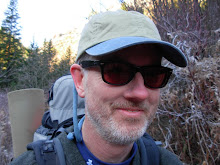One morning in 2002, in the last days of winter, I was poling through a bony forest of aspen and fir on a cross-country ski track I knew would break from the trees and circle miles of meadow. I’d trained and raced here in the 1970s at the base of a mountain outside Aspen, Colorado where I grew up, and across the road from the high school where I was a student. Now, after many years away, I followed the track across terrain reshaped by dozens of huge new homes. This is a ski town, after all, and it’s logical someone would preserve the course. The houses had great picture windows, wraparound decks, outdoor swimming pools, hot tubs, high stone walls and chimneys and they stood on land I always imagined as hunting and camping grounds for the Ute Indians who roamed the valley until miners, ranchers and soldiers began pushing them out 160 years ago. The land had been for me a vaguely wild place, the domain of bear, deer, coyotes, and, in winter, of skiers like myself. Sunlight still tumbled through branches, casting bright, fractured stains on snow just as I remembered.
Around a corner, a few hundred feet through the trees from one home, I heard voices whose intonations sounded like Bambara, a language of West Africa, where I’ve traveled and worked over three decades. I skidded to a stop and listened, peering through the trees at three coal-skinned African men on a deck in parkas and ski caps. One shoveled snow, carefully dumping rather than tossing each load off the deck, while the second man stood beside a blue plastic tub of cleaning liquids and rags set on the deck railing. The third, hands thrust in his jean pockets, sat on a bench, talking. I realized they were the help—“house boys” in resort town parlance—and I listened a few minutes, understanding nothing. I don’t know Bambara, but I speak French, the language of one of West Africa’s former colonial masters. I shouted, “Bonjour.” The men stopped talking and gathered at the edge of the deck to peer back through the woods at me, a tall figure in a blue Windbreaker and ski pants. They said nothing. I waved and shouted, “Assalamu Alaykum,” an Arabic peace greeting common in the Muslim world, which is to say, throughout West Africa. I hoped they’d invite me over but the men looked at one another, exchanged words and hurried inside the house. They left the plastic tub on the railing and the shovel lying in the snow. I stared after them, feeling foolish. The men were far from home in a place so different from their dry, impoverished homeland that my greetings must have made them suspicious. Maybe they thought I was an immigration officer. I skied on, touring the meadow and wondering how these men, in search of a better life and means to support families, had managed to leave their desert villages for a country so increasingly paranoid about its borders. I was curious about the risks they’d taken and how they’d survived. Two hours later I returned to that house, hoping to explain myself and welcome the Africans to the Rocky Mountains, where the sun is as dangerous as in the Sahara. But the deck was empty. Fearing trouble with their employer, I didn’t knock on the door.
Wednesday, January 16, 2008
Subscribe to:
Post Comments (Atom)

No comments:
Post a Comment